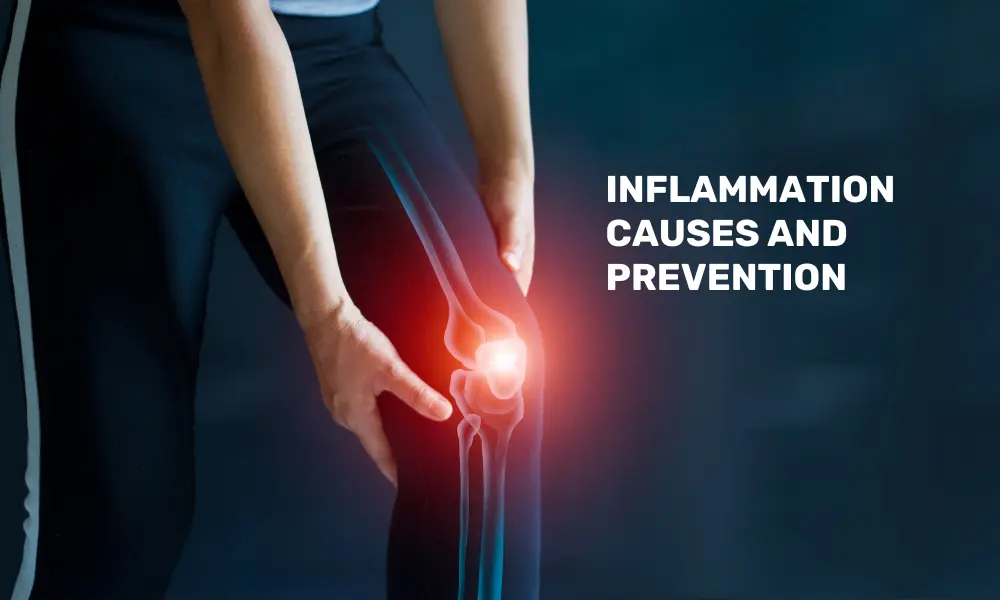When our body tries to heal itself, it fights against harmful substances, wounds, infections, and poisons. This process is known as inflammation.
Antibodies and proteins are released during this reaction, and the wounded area receives more blood flow when it persists. This keeps the body on high alert, resulting in chronic inflammation.
Chronic inflammation may eventually harm our organs and tissues. According to some studies, persistent inflammation may also contribute to several illnesses, including stroke and cancer.
What causes inflammation in the body?
Several factors can increase the risk of chronic inflammation:
-
Old age: Our immune systems alter with age, which may cause an increased inflammatory response.
-
The decline in the body’s ability to regulate inflammation
-
Being overweight
-
A diet heavy in added sugar and bad fats: Eating foods heavy in added sugar and harmful fats, like saturated fats and trans fats can cause inflammation. These ingredients can raise the body’s inflammatory marker levels and speed the onset of chronic illnesses.
-
Presence of Cytokines: Cytokines are chemicals that cause inflammation. They are produced by excess body fat, especially visceral fat around the abdomen. These cytokines can potentially cause low-grade inflammation to remain persistent throughout the body.
-
Poor sleep: Inadequate or poor-quality sleep can have a detrimental effect on the body’s inflammatory response. When sleep-deprived, pro- and anti-inflammatory molecules are out of balance, increasing inflammation and raising the risk of chronic illnesses.
-
Stress: The stress hormone Cortisol and other stress hormones are released during ongoing stress, which can impair the immune system and cause inflammation. Long-term stress can cause the body to remain hypervigilant, leading to chronic inflammation.
-
Low sex hormones: Estrogen and testosterone, two sex hormones, have anti-inflammatory qualities. The aging process, illnesses, or therapies that cause low levels of these hormones can impair the body’s capacity to regulate inflammation.
-
Smoking: Many chemicals found in tobacco smoke can irritate and cause inflammation in the body. Smoking can cause tissue damage and raise inflammatory cytokine production, which can prolong a chronic inflammatory condition.
Anti-inflammatory diet
An anti-inflammatory diet includes foods rich in nutrients that can help reduce inflammation. Critical components of this diet include:
-
High-Fiber Foods: Promote gut health and reduce inflammation; contains vegetables, fruits, and whole grains.
-
Fruit: Blueberries and oranges are packed with vitamins, antioxidants, and fiber, all of which help combat inflammation.
-
Tomatoes: Rich in lycopene, an antioxidant that helps fight inflammation.
-
Olive Oil: It contains healthy fats and antioxidants that have anti-inflammatory properties.
-
Fatty Fish: Salmon and sardines are rich in omega-3 fatty acids, which help reduce inflammation.
-
Nuts: Walnuts and almonds provide healthy fats and antioxidants.
Inflammation is not good for our overall health. If there is any inflammatory activity in the body, one must consult a doctor.
FAQ on Inflammation
What is the leading cause of inflammation in the body?
Many different things can cause inflammation. The most common pathogens (germs) are bacteria, viruses, and fungi. External injuries like scrapes or damage from foreign objects can also cause inflammation.
How do I reduce inflammation in my body?
Healthy eating tips to help reduce inflammation
-
Eat plenty of fiber, fruits and vegetables
-
Choose high-fiber carbohydrates
-
Choose plant-based and leaner animal protein sources
-
Be conscious of fat sources
-
Reduce sugar intake
-
Limit or avoid alcohol
Can inflammation be cured?
If inflammatory cells stay too long in our body, it may lead to chronic inflammation. It is a symptom of certain health conditions, like rheumatoid arthritis. One must reduce inflammation by eating anti-inflammatory foods and managing stress.
What are the seven most inflammatory foods?
These seven high-inflammatory foods can sap your energy and raise your risk for cancer, diabetes, and heart disease
-
Char-grilled meat.
-
Processed meat products.
-
Alcohol.
-
Deep-fried foods.
-
Sugary foods and drinks.
-
Ultra-processed foods.
-
Highly refined carbs.





